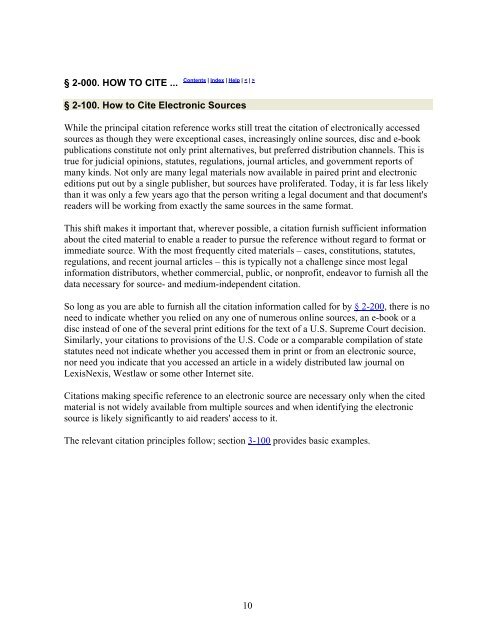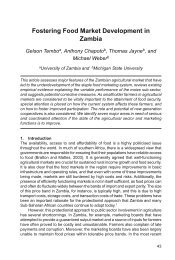- Page 2 and 3: Introduction to BASIC LEGAL CITATIO
- Page 4 and 5: � § 2-455. Agency Adjudication C
- Page 6 and 7: o § 6-300. Signals o § 6-400. Ord
- Page 8 and 9: work is filled with linked cross re
- Page 10 and 11: have been altered by its editors to
- Page 12 and 13: COMMUNITY FOR CREATIVE NON-VIOLENCE
- Page 14 and 15: Appeals and those for the U.S. Dist
- Page 16 and 17: While the formats and other details
- Page 20 and 21: ¡But see § 2-115(2)! Where no uni
- Page 22 and 23: § 2-200. How to Cite Judicial Opin
- Page 24 and 25: § 2-210(c) Examples - Czapinski v.
- Page 26 and 27: § 2-220(2) Examples - Flamme v. Wo
- Page 28 and 29: sequential number assigned by the C
- Page 30 and 31: § 2-250. Citing Unpublished Cases
- Page 32 and 33: electronic compilations are in gene
- Page 34 and 35: § 2-330. Statute Citations - Condi
- Page 36 and 37: what turns out to have been a short
- Page 38 and 39: § 2-340(2) Example - Social Securi
- Page 40 and 41: Element (b) - So long as there are
- Page 42 and 43: egulations. If the regulation is to
- Page 44 and 45: Element (b) - The order or proclama
- Page 46 and 47: § 2-490(2) Examples - Authority Un
- Page 48 and 49: § 2-600. How to Cite Court Rules -
- Page 50 and 51: Point 2: The Bluebook and the ALWD
- Page 52 and 53: Principle: The components of a jour
- Page 54 and 55: § 2-820. Journal Article Citations
- Page 56 and 57: § 2-820(5) Examples - John D. Feer
- Page 58 and 59: § 2-900. How to Cite Documents fro
- Page 60 and 61: • Bankruptcy Courts and Bankruptc
- Page 62 and 63: • Navajo Freight Lines v. Bibb, 1
- Page 64 and 65: Arkansas • Whiteside v. Russellvi
- Page 66 and 67: Delaware • Reagan v. Del. Ass'n o
- Page 68 and 69:
Indiana • Slater v. Akron Exch. S
- Page 70 and 71:
Maryland • Three Garden Vill. Ltd
- Page 72 and 73:
Missouri • Lewis v. St. Louis Ind
- Page 74 and 75:
New York • Anderson v. Rehab. Pro
- Page 76 and 77:
Oklahoma • Oliver v. Farmers Ins.
- Page 78 and 79:
South Dakota • Jansen v. Lemmon F
- Page 80 and 81:
Washington • State v. Heddrick, 1
- Page 82 and 83:
§ 3-220. Case Citations - Variants
- Page 84 and 85:
§ 3-320. Statute Citations - Most
- Page 86 and 87:
Arkansas • Ark. Code § 4-1-101 (
- Page 88 and 89:
Delaware • Del. Code tit. 6, § 1
- Page 90 and 91:
Idaho • Idaho Code Ann. § 28-1-1
- Page 92 and 93:
Kansas • an. Stat. Ann. § 84-1-1
- Page 94 and 95:
Massachusetts • Mass. Gen. Laws c
- Page 96 and 97:
Nebraska • Neb. Rev. Stat. § 2-1
- Page 98 and 99:
New York • N.Y. U.C.C. Law § 1-1
- Page 100 and 101:
Oregon • Or. Rev. Stat. § 71.101
- Page 102 and 103:
Texas • Tex. Bus. & Com. Code §
- Page 104 and 105:
West Virginia • W. Va. Code § 46
- Page 106 and 107:
Model Bus. Corp. Act § 10.01 (2002
- Page 108 and 109:
Alabama Alaska • Ala. Admin. Code
- Page 110 and 111:
Idaho • Idaho Admin. Code r. 07.0
- Page 112 and 113:
Massachusetts • 105 Code Mass. Ru
- Page 114 and 115:
New Mexico • N.M. Admin. Code §
- Page 116 and 117:
South Dakota • Admin. R. S.D. 5:0
- Page 118 and 119:
Wyoming • 025-220-001 Code Wyo. R
- Page 120 and 121:
§ 3-500. Arbitration Decisions Ill
- Page 122 and 123:
§ 3-724. Annotations Illustrations
- Page 124 and 125:
Additional Examples Christopher M.
- Page 126 and 127:
§ 4-000. ABBREVIATIONS AND OMISSIO
- Page 128 and 129:
F-L • Distributor or Distributing
- Page 130 and 131:
S T-Z • Railway - Ry. «e.g.»
- Page 132 and 133:
§ 4-300(3) Examples - Buenz v. Fro
- Page 134 and 135:
§ 4-300(9) Examples - Glen v. Sewe
- Page 136 and 137:
• Maine - Me. «e.g.» • Maryla
- Page 138 and 139:
§ 4-800. Spacing between Abbreviat
- Page 140 and 141:
§ 5-000. UNDERLINING AND ITALICS [
- Page 142 and 143:
§ 6-000. PLACING CITATIONS IN CONT
- Page 144 and 145:
ecommended. The word "but" is omitt
- Page 146 and 147:
§ 6-520. Short Form Citations - Ca
- Page 148 and 149:
Full Citation 42 U.S.C. § 405(c)(2
- Page 150 and 151:
§ 6-560. Short Form Citations - Jo
- Page 152 and 153:
Grand Central Station or the waitin
- Page 154 and 155:
§ 7-000. CROSS REFERENCE TABLES §
- Page 156 and 157:
Case Name Abbreviations Rule 10.2.2
- Page 158 and 159:
• § 2-470. Agency Report Citatio
- Page 160 and 161:
§ 7-400. Cross Reference Table: AL
- Page 162 and 163:
• § 4-500. Territorial Abbreviat
- Page 164 and 165:
• North Carolina [Cases] [Statute
- Page 166 and 167:
Court of Alabama. Citations shall r
- Page 168 and 169:
Restatement (Second) of Contracts
- Page 170 and 171:
. . . . (7) Argument. Arguments sha
- Page 172 and 173:
California: Supreme Court citation
- Page 174 and 175:
Colo. C.J. Directive 12-01, http://
- Page 176 and 177:
Colorado Court of Appeals: Primary
- Page 178 and 179:
esult of the amendment, it was not
- Page 180 and 181:
D.C. Ct. App. R 28(g), http://www.d
- Page 182 and 183:
(3) For opinions not published in F
- Page 184 and 185:
(o) Case Names. Case names shall be
- Page 186 and 187:
70 Haw. 206, 208, 767 P.2d 1238, 12
- Page 188 and 189:
. . . . Where, as here, the languag
- Page 190 and 191:
Ind. R. App. P. 22, http://www.in.g
- Page 192 and 193:
E. Abbreviations. The following abb
- Page 194 and 195:
(3) Citations to all other authorit
- Page 196 and 197:
All citations of Kentucky Statutes
- Page 198 and 199:
B. These rules shall apply to all p
- Page 200 and 201:
[This order and all others of its v
- Page 202 and 203:
(1) A table of contents and a table
- Page 204 and 205:
specific terms, the general term is
- Page 206 and 207:
Note: The full order sets out a com
- Page 208 and 209:
(ii) for cases decided from and aft
- Page 210 and 211:
P.3d 603 (citing Mont. Const. art.
- Page 212 and 213:
THEREFORE, IT IS ORDERED that, effe
- Page 214 and 215:
. . . . Our decision finds support
- Page 216 and 217:
New Jersey: Supreme Court citation
- Page 218 and 219:
New Mexico: Supreme Court citation
- Page 220 and 221:
New York: Court of Appeals citation
- Page 222 and 223:
ules which are more strict when the
- Page 224 and 225:
EXPLANATORY NOTE Rule 11.6 was adop
- Page 226 and 227:
Ohio Sup. Ct. R. for the Reporting
- Page 228 and 229:
the duties of the Department, Okla.
- Page 230 and 231:
Supreme Court, " 9" is paragraph nu
- Page 232 and 233:
paragraph number 9 of the opinion a
- Page 234 and 235:
(3) an index of all authorities ref
- Page 236 and 237:
municipal ordinances; however, a to
- Page 238 and 239:
(2) Statutes which have not yet bee
- Page 240 and 241:
• Speers o 17 S.C. Eq. (Speers Eq
- Page 242 and 243:
• Riley o 22 S.C.L. (Ril.) • Du
- Page 244 and 245:
citation in the table of cases in a
- Page 246 and 247:
The El Paso Hospital District opera
- Page 248 and 249:
Menzies should be allowed to supple
- Page 250 and 251:
After publication in Pacific Report
- Page 252 and 253:
Virginia: Supreme Court citation pr
- Page 254 and 255:
. . . . 14 The Department argues th
- Page 256 and 257:
Wisconsin: Supreme Court citation p
- Page 258 and 259:
Smith v. Jones, 214 Wis. 2d 408, 41
- Page 260 and 261:
(5) In the case of opinions or subs
- Page 262 and 263:
TOPICAL INDEX Contents | Index | He
- Page 264 and 265:
C Case citations (see also Dates, O
- Page 266 and 267:
D E Courts federal citation example
- Page 268 and 269:
J L Initials in party names in book
- Page 270 and 271:
Parenthetical references arbitratio
- Page 272 and 273:
"See also" (see also Signals) "See
- Page 274:
U V W Y Underlining or italics Unif




